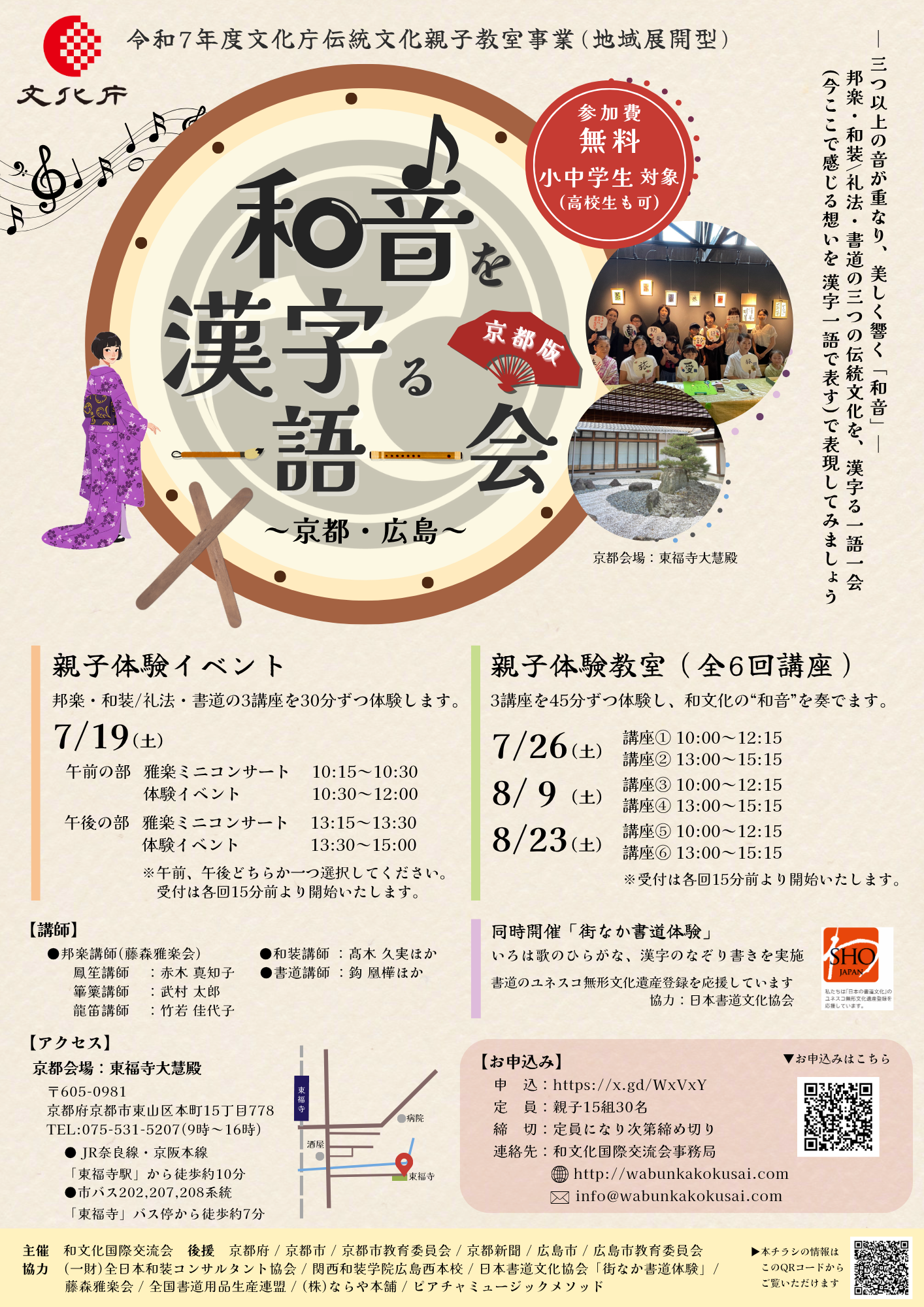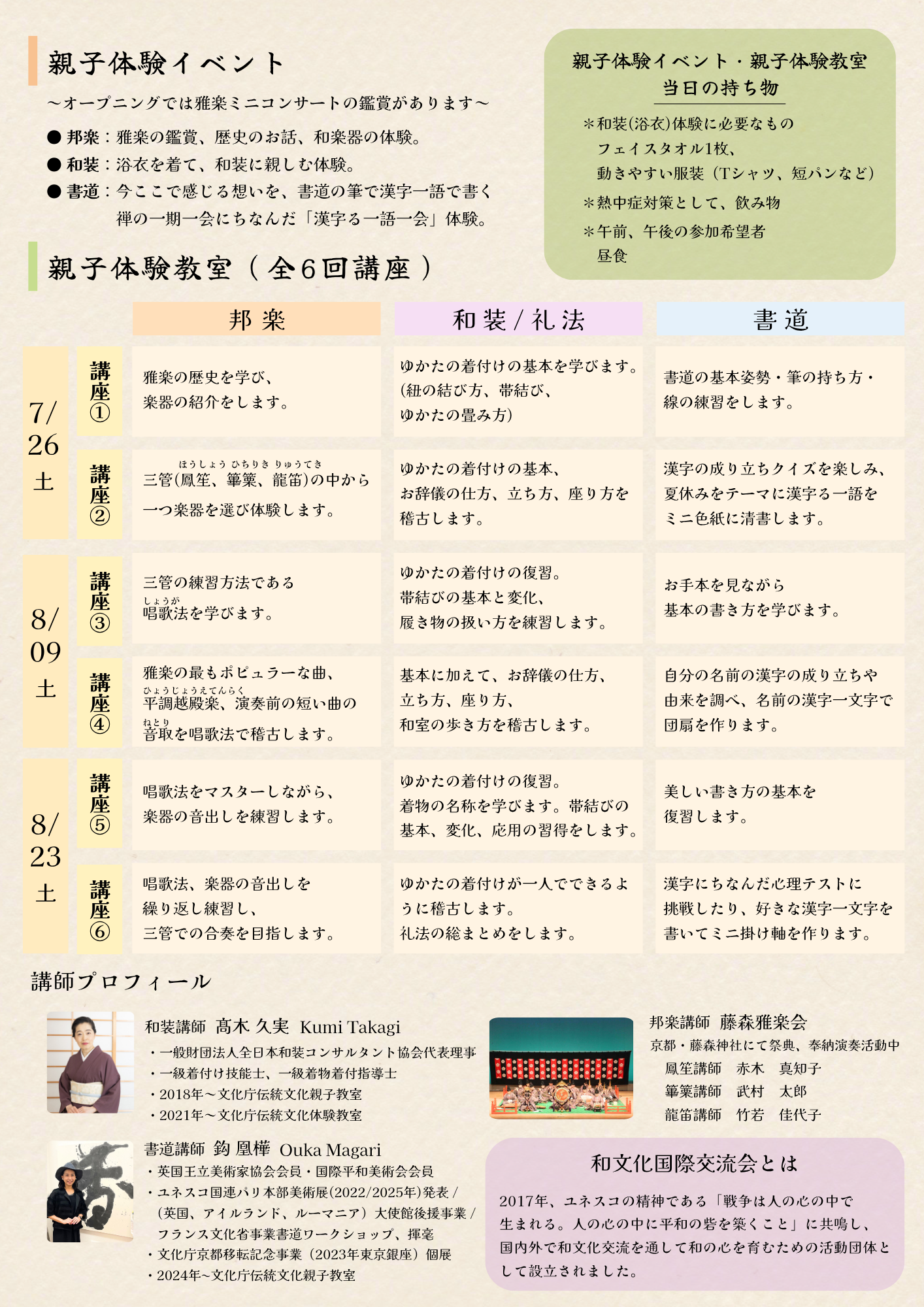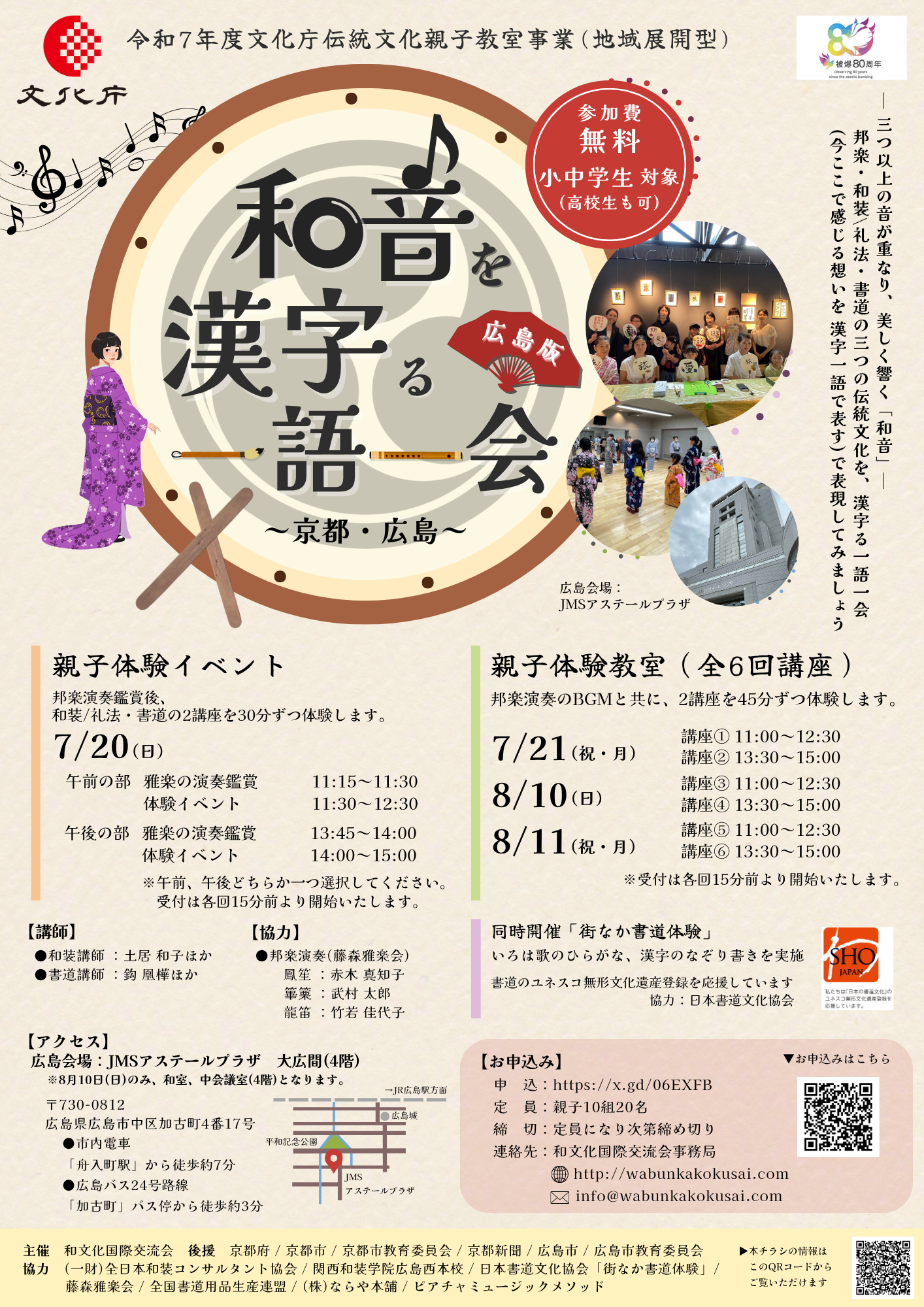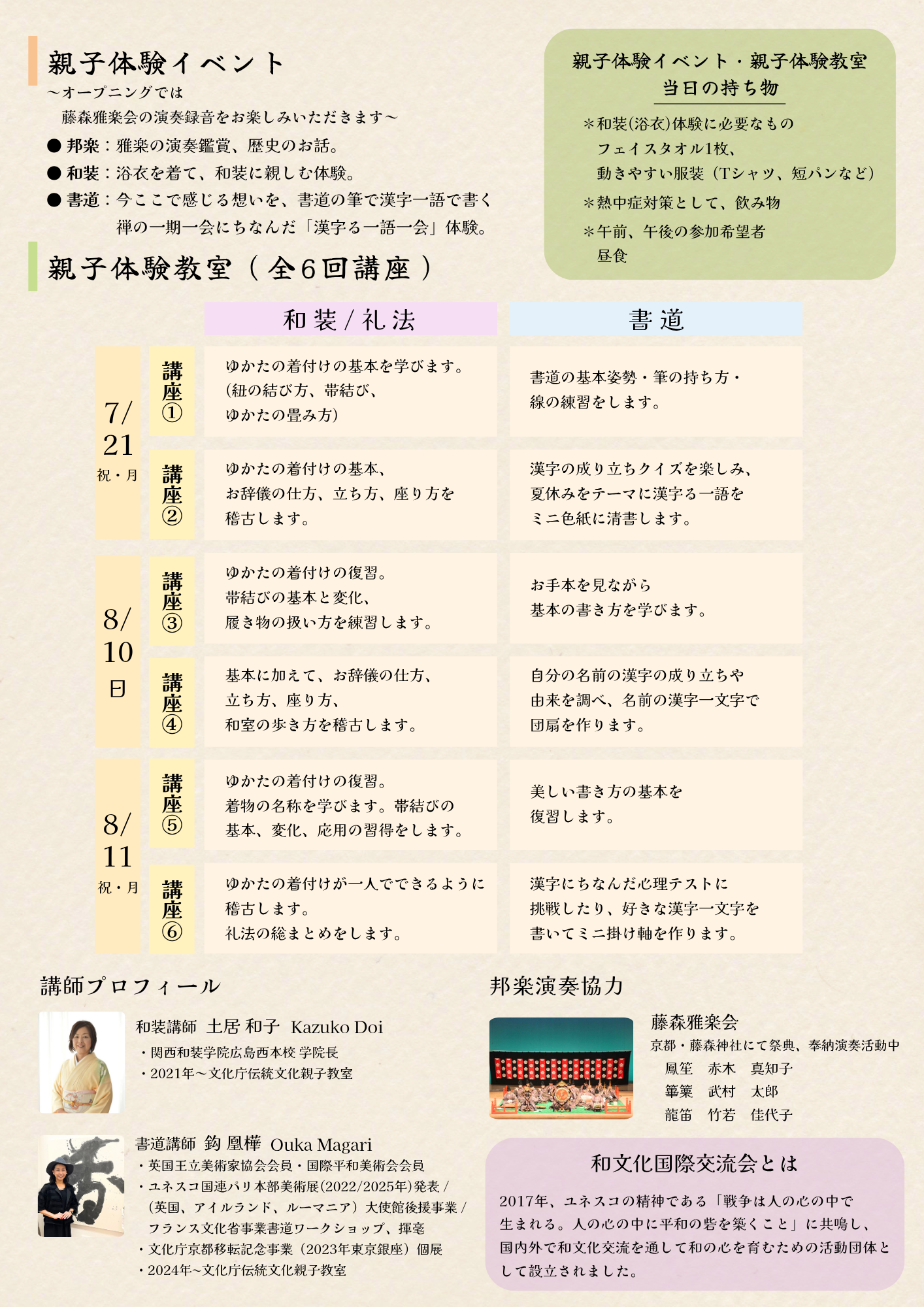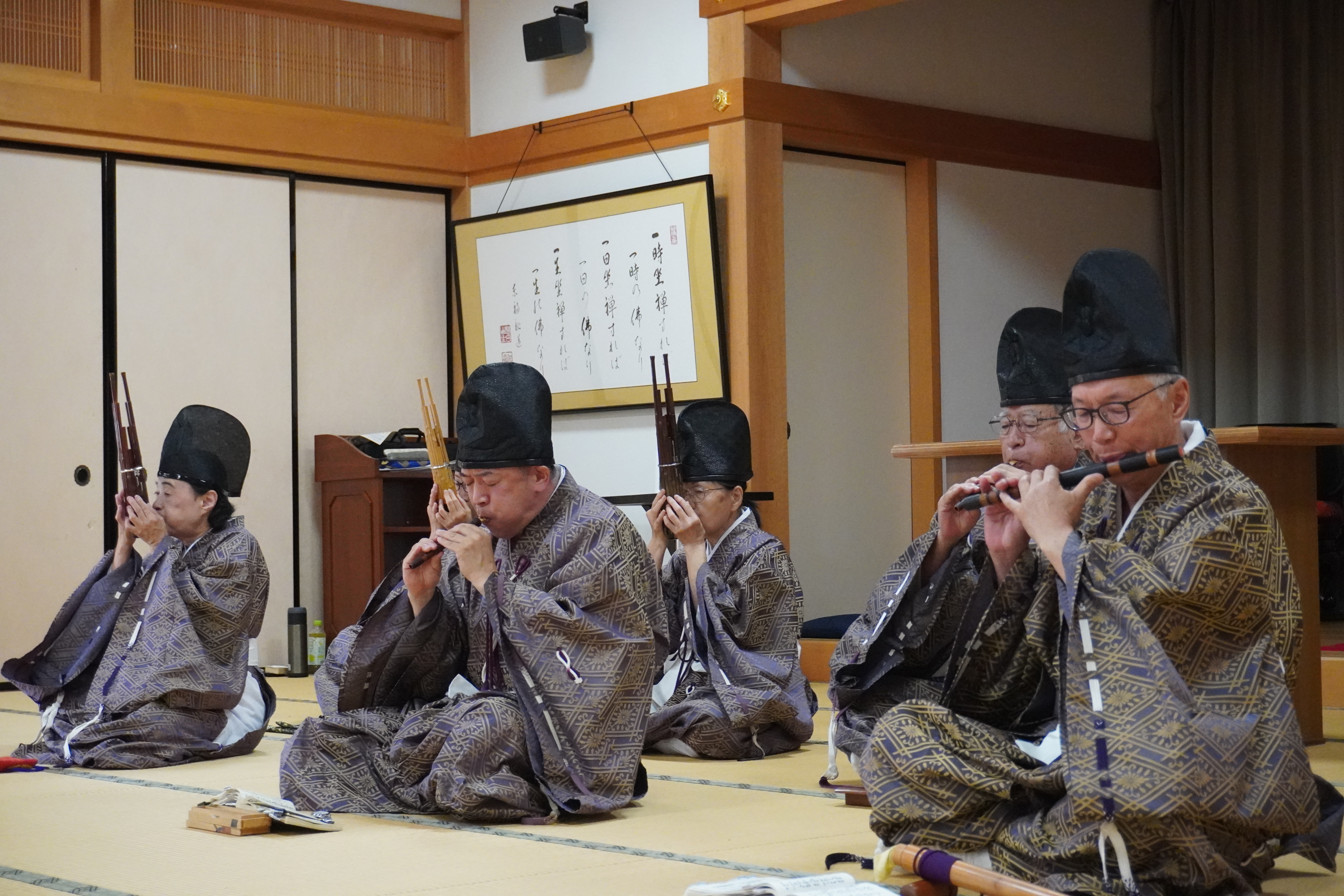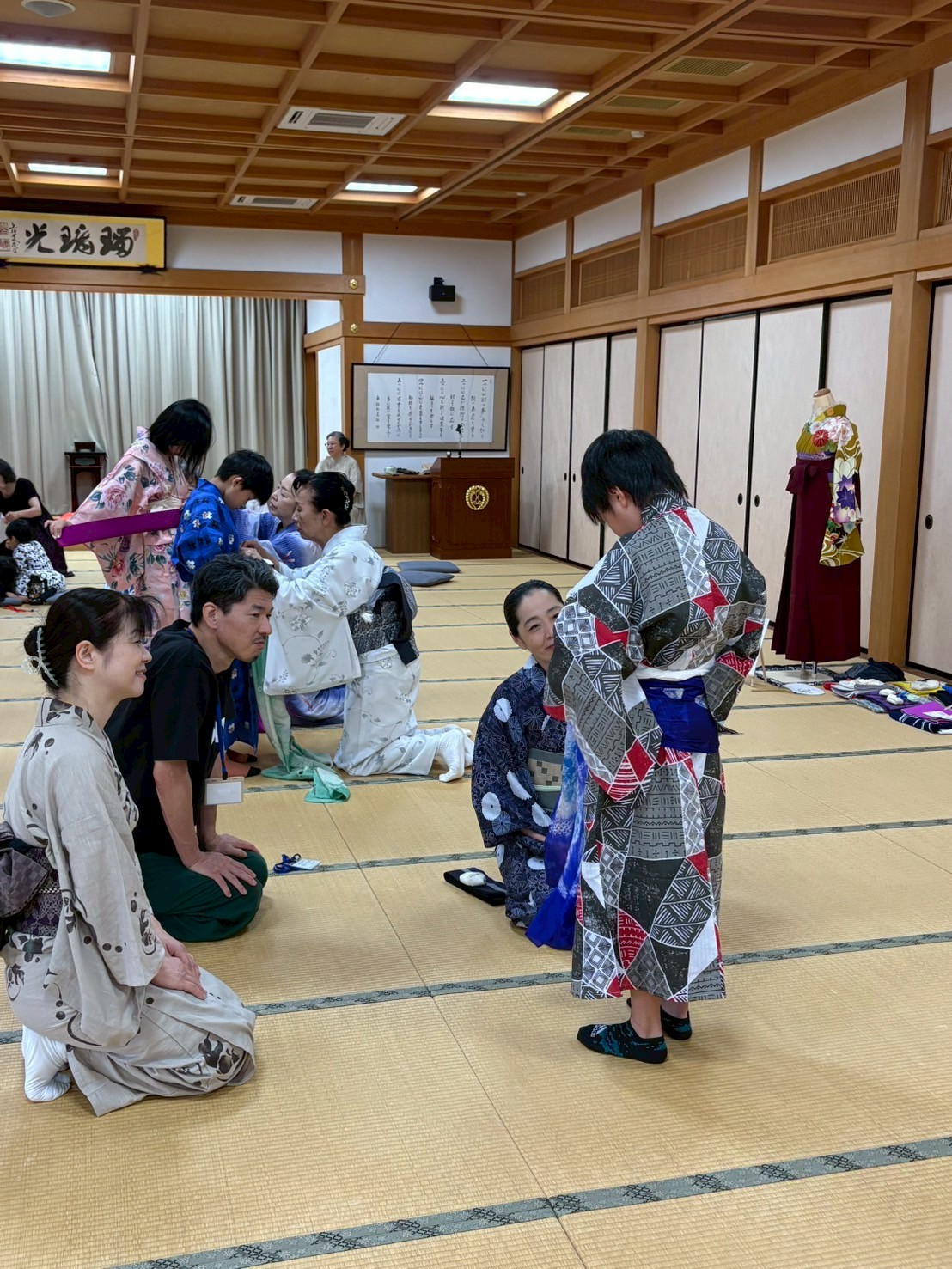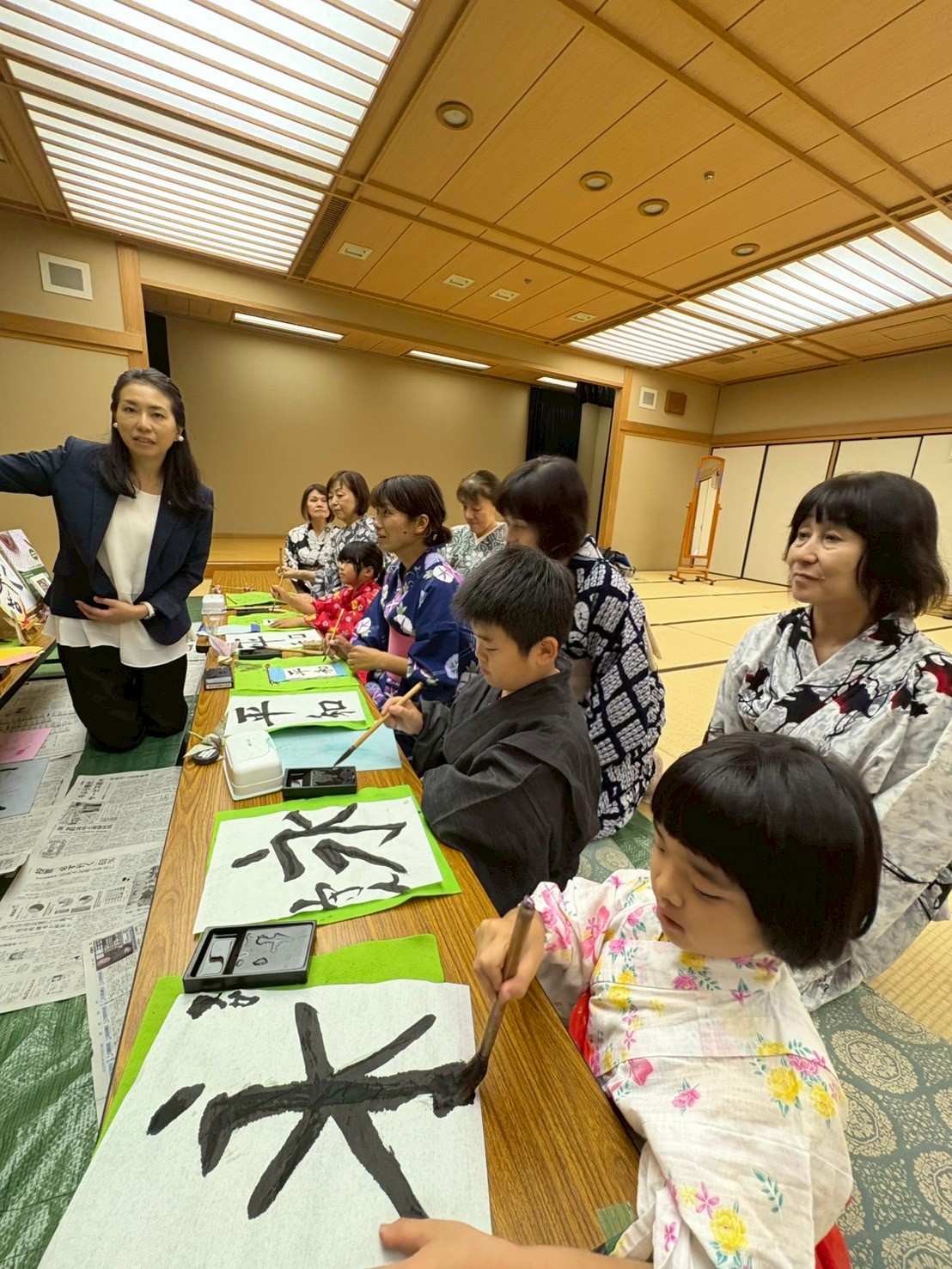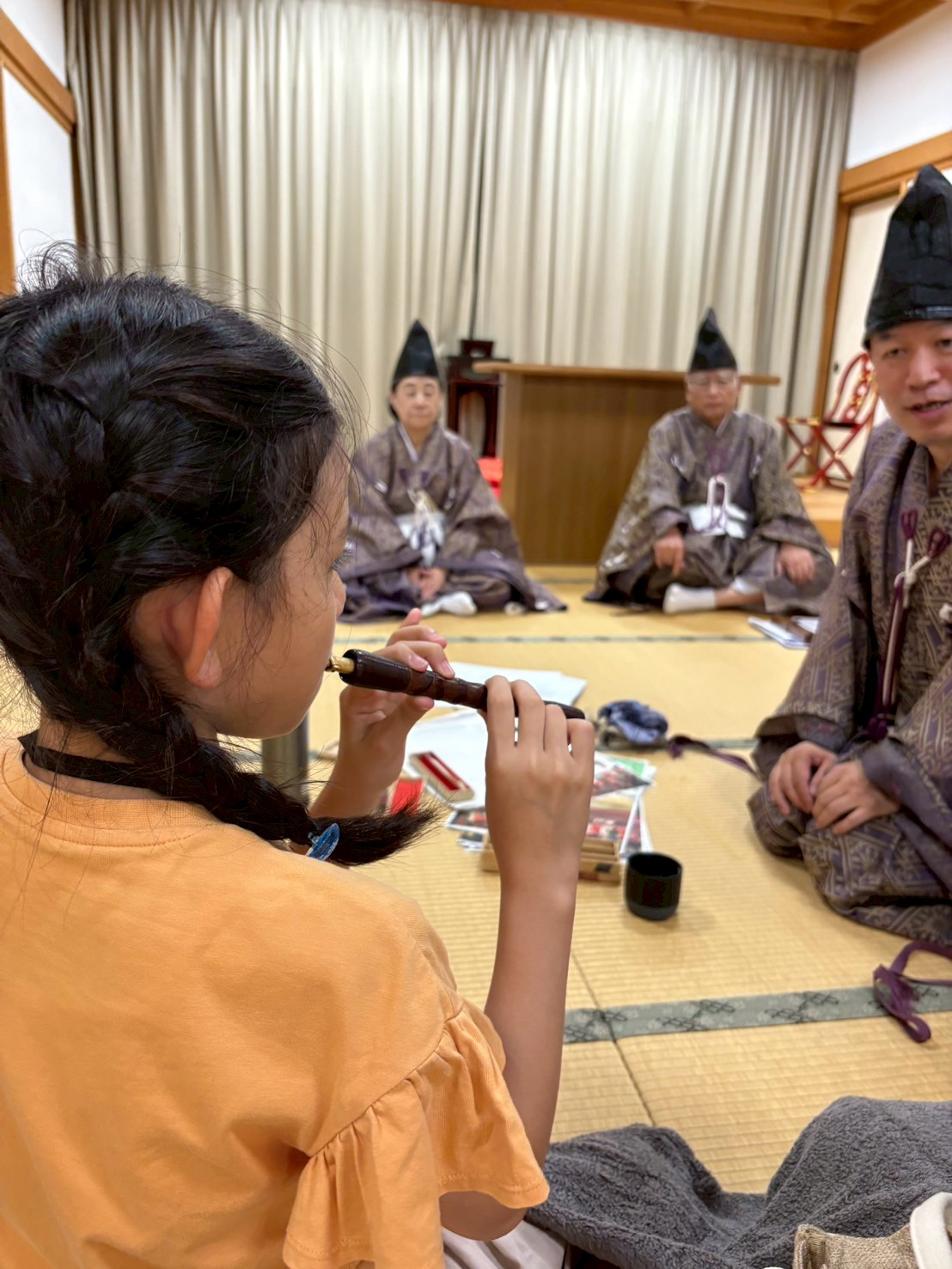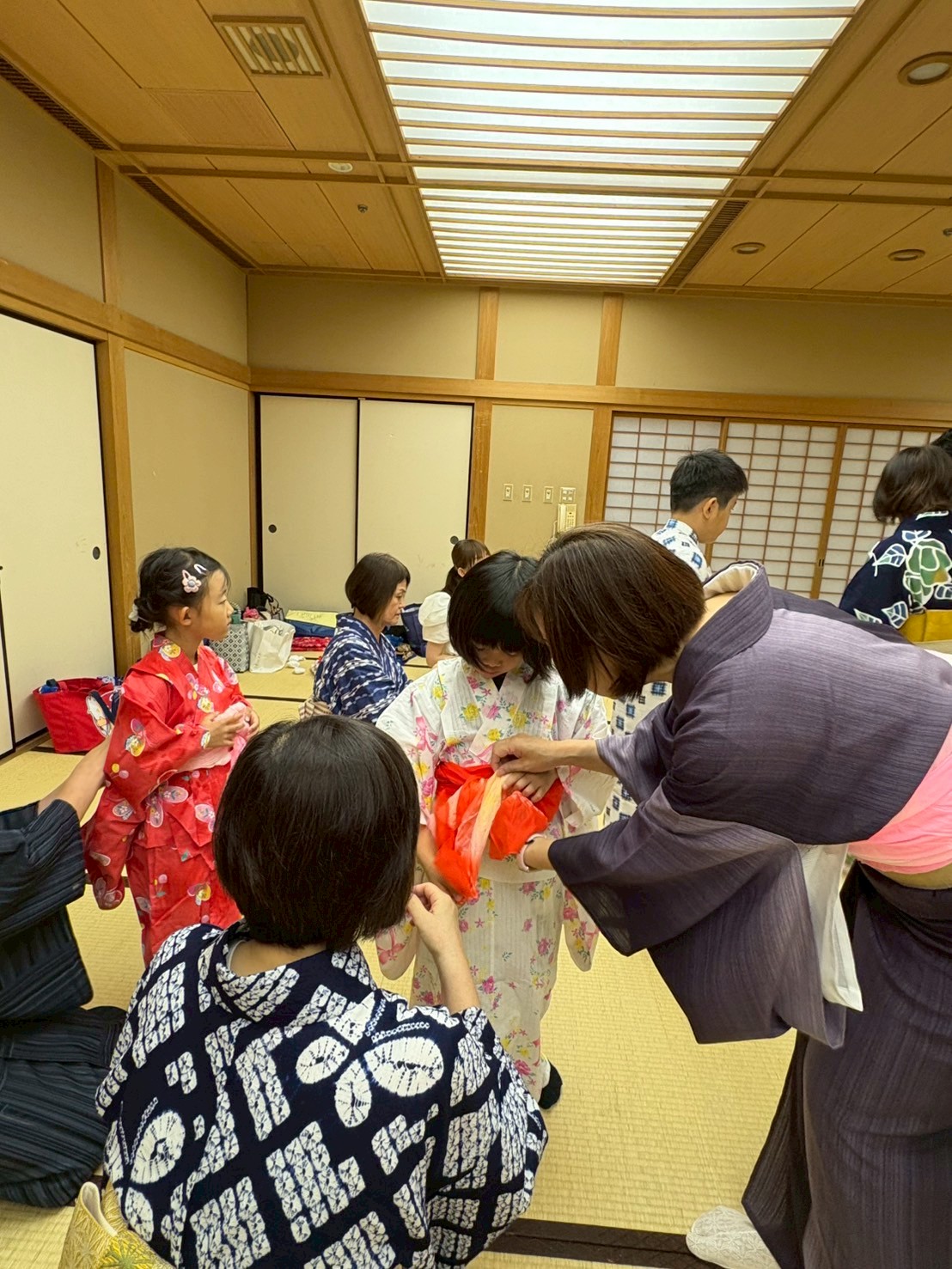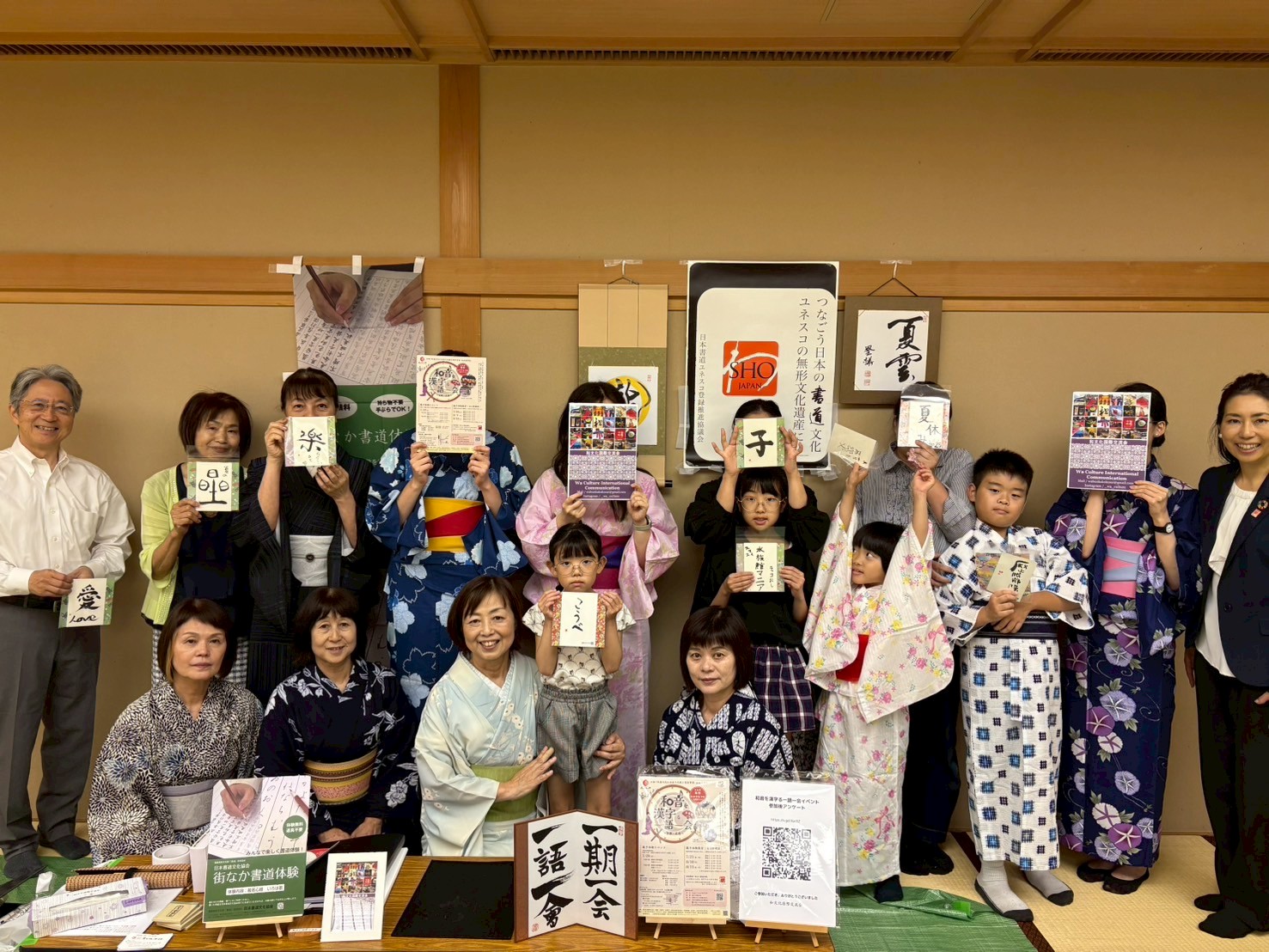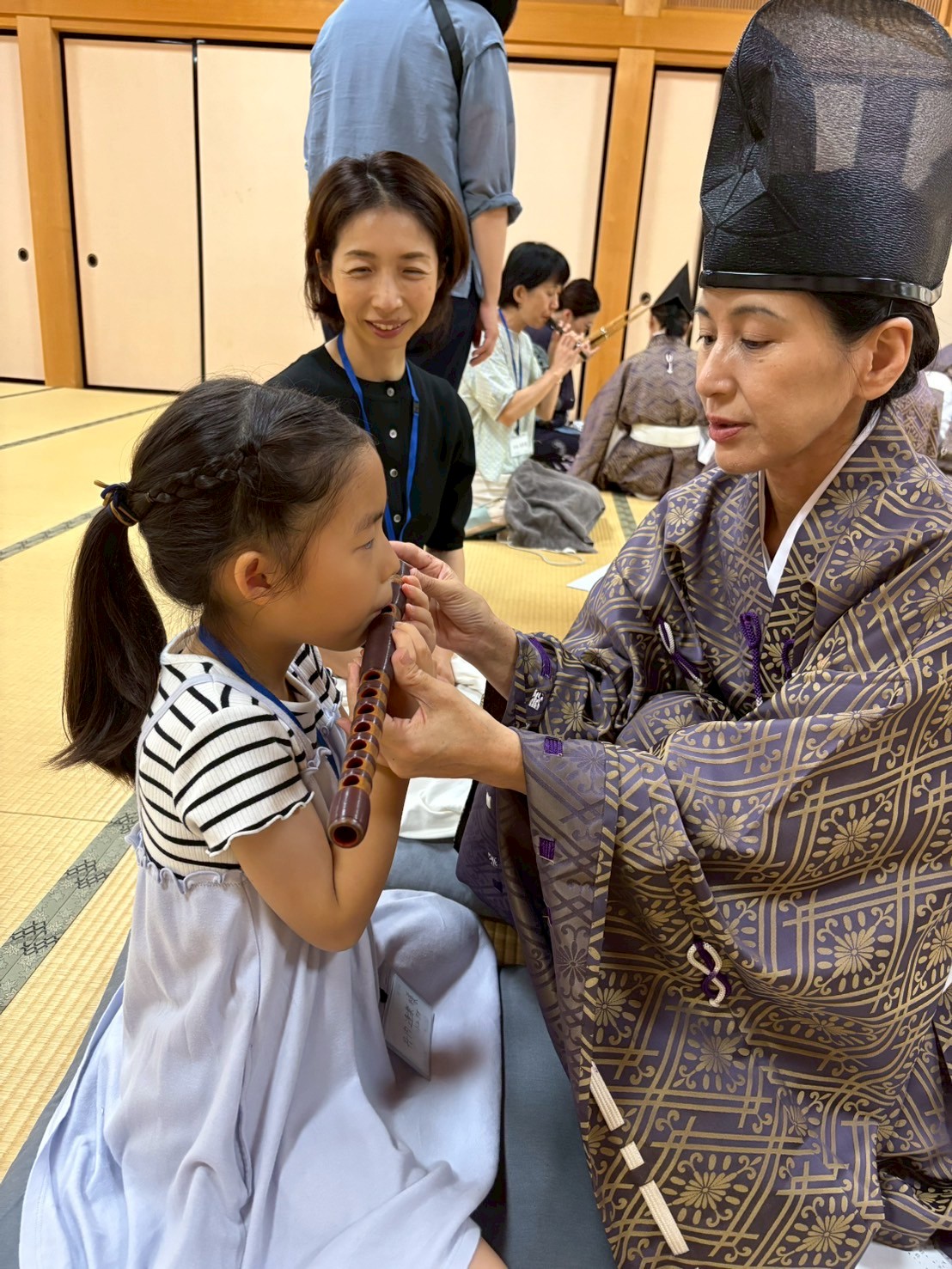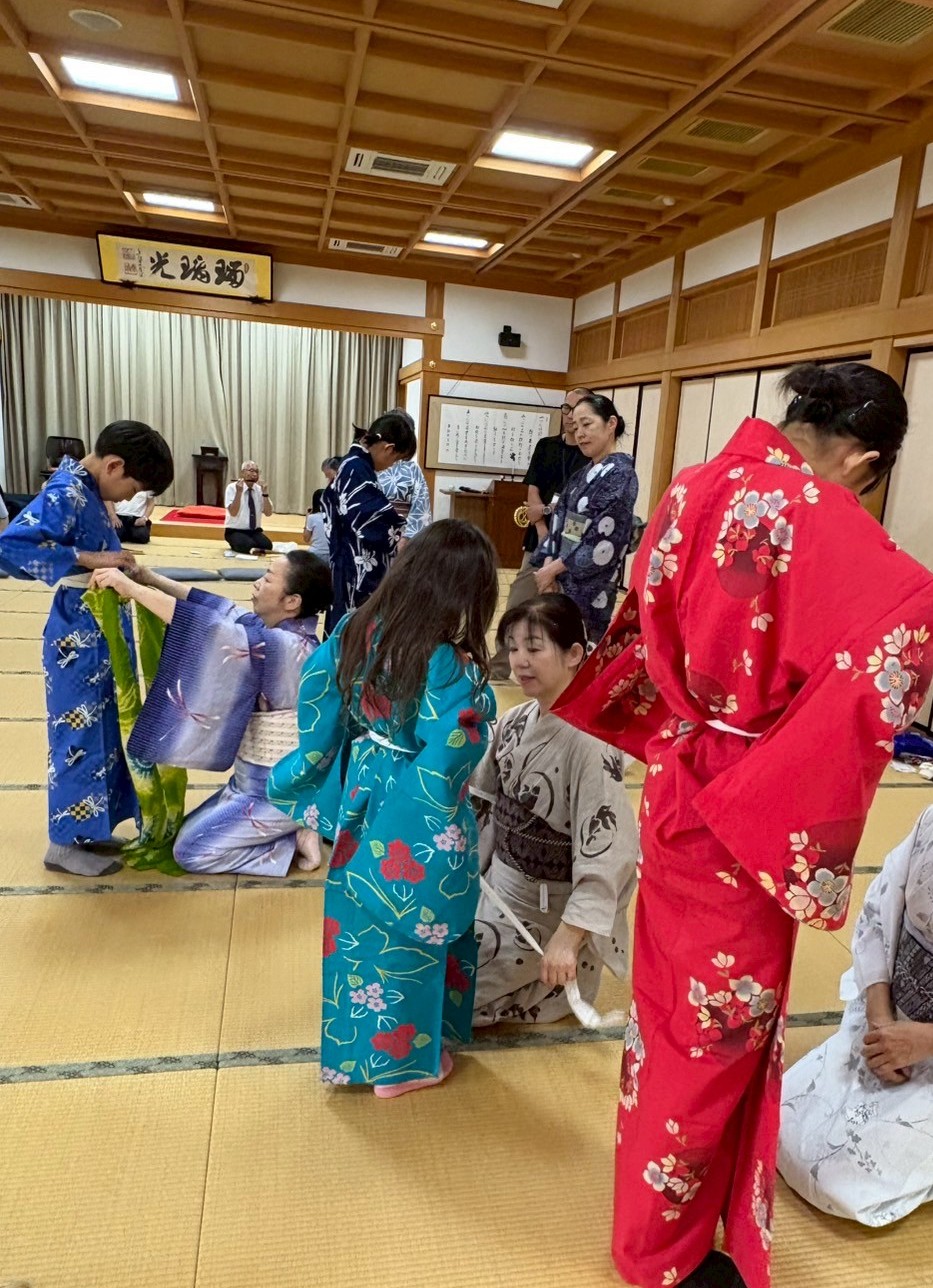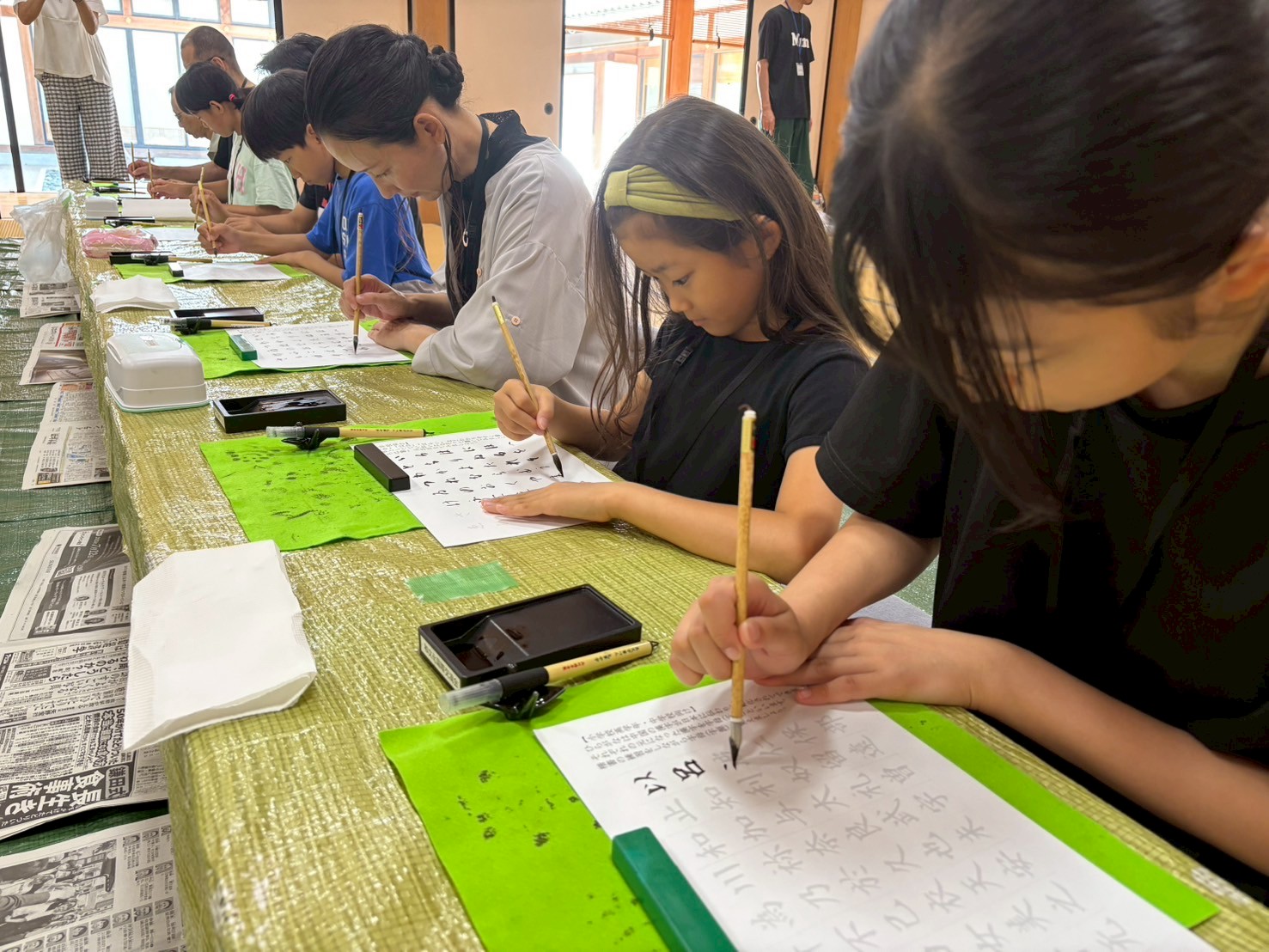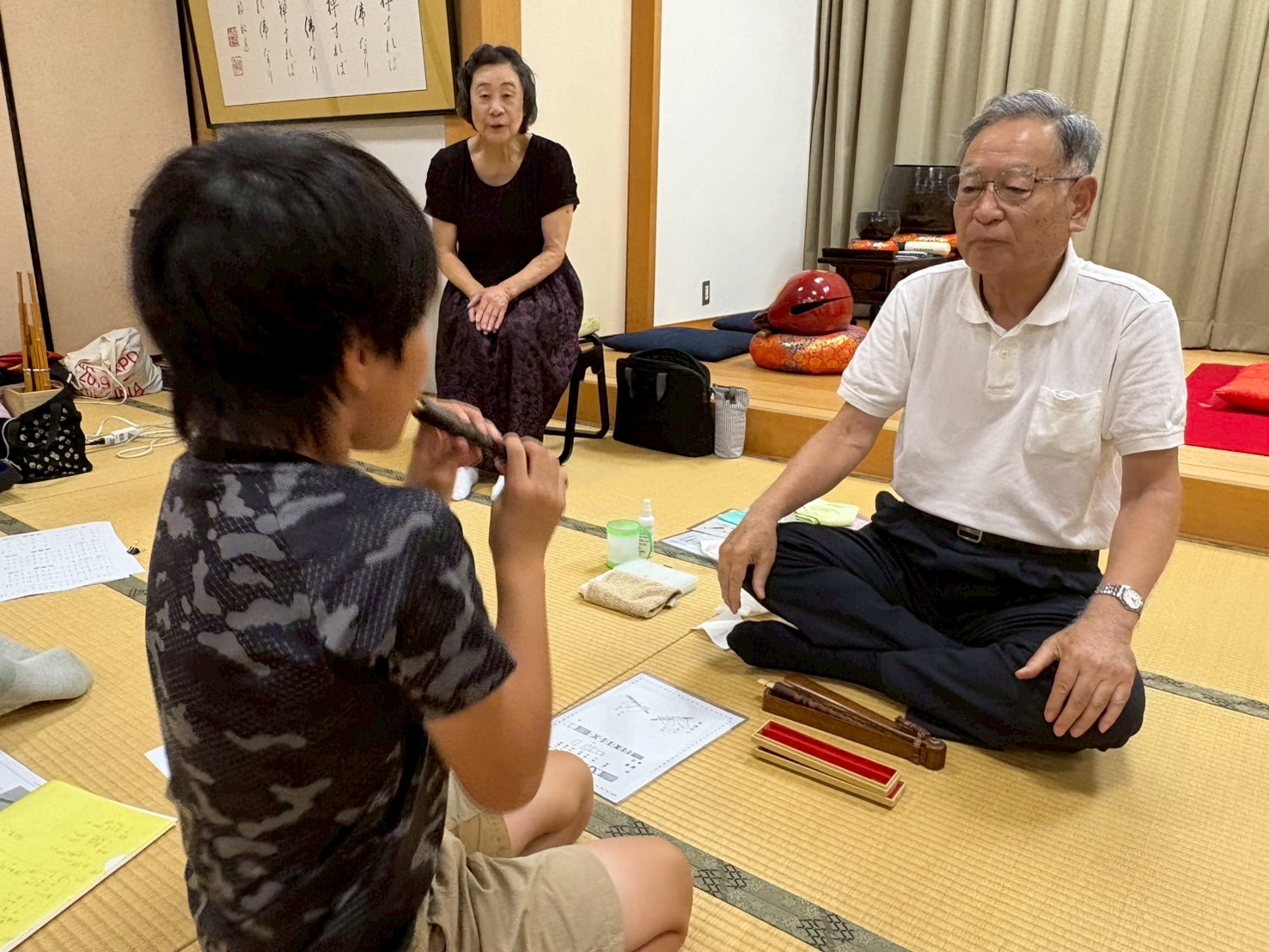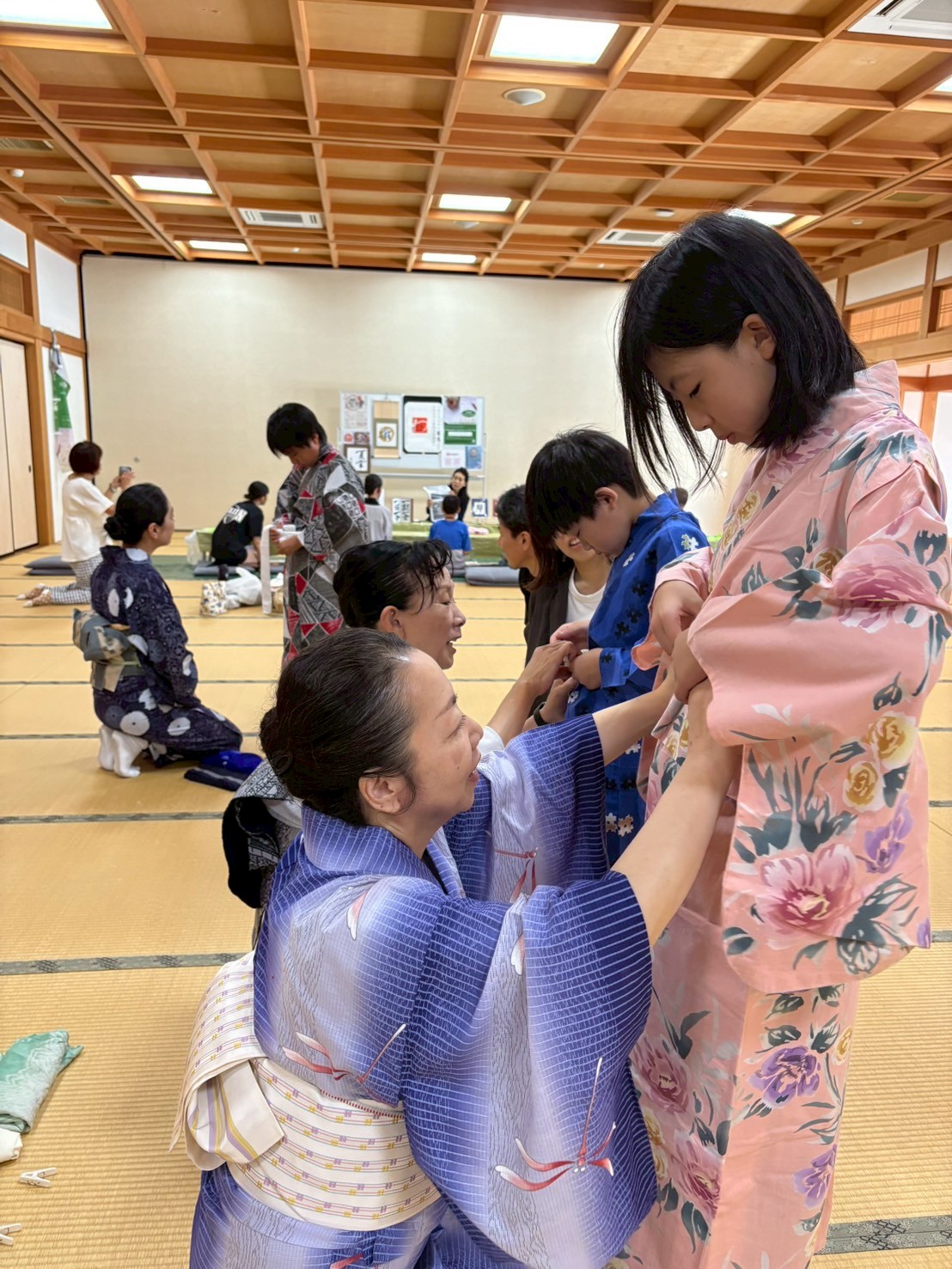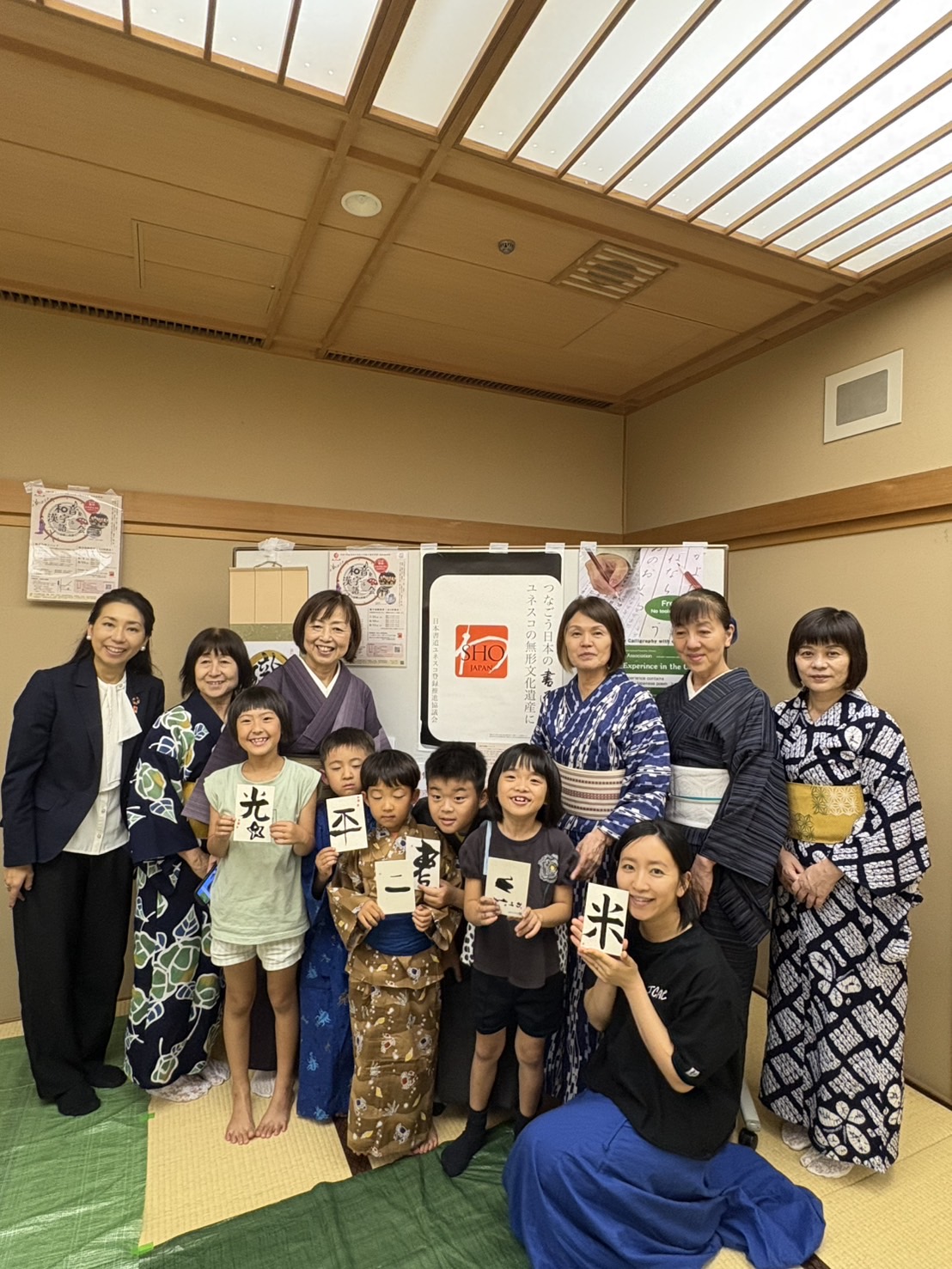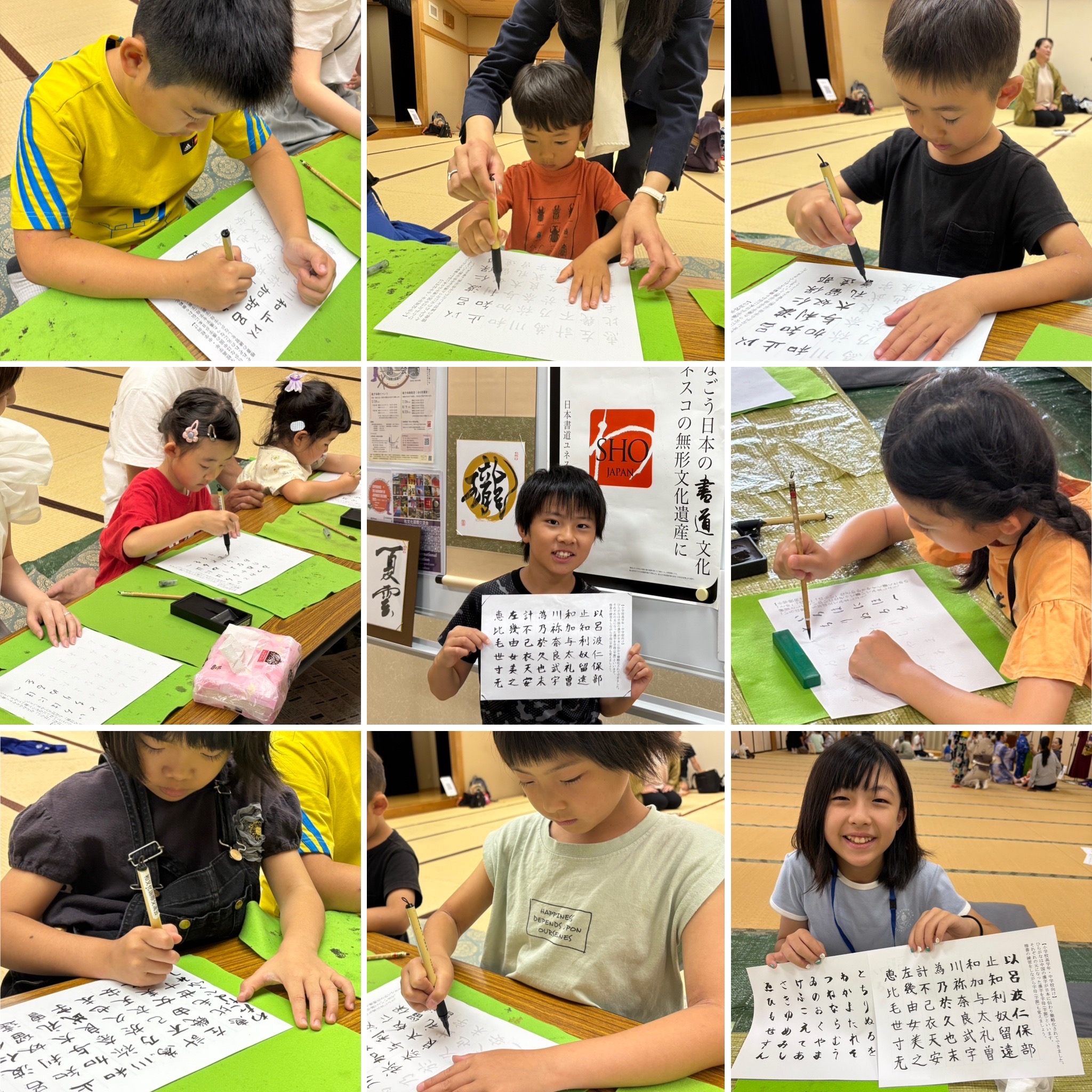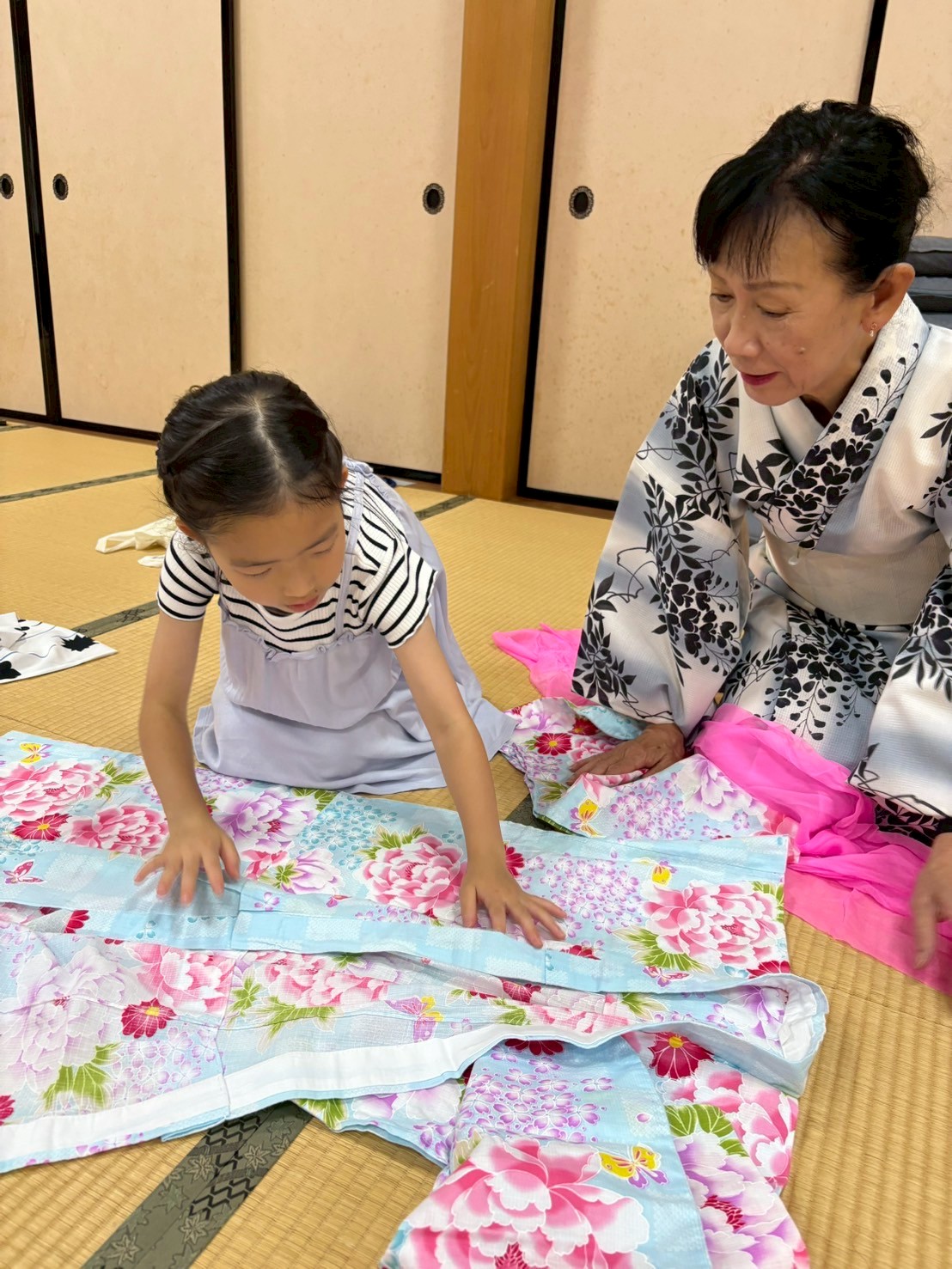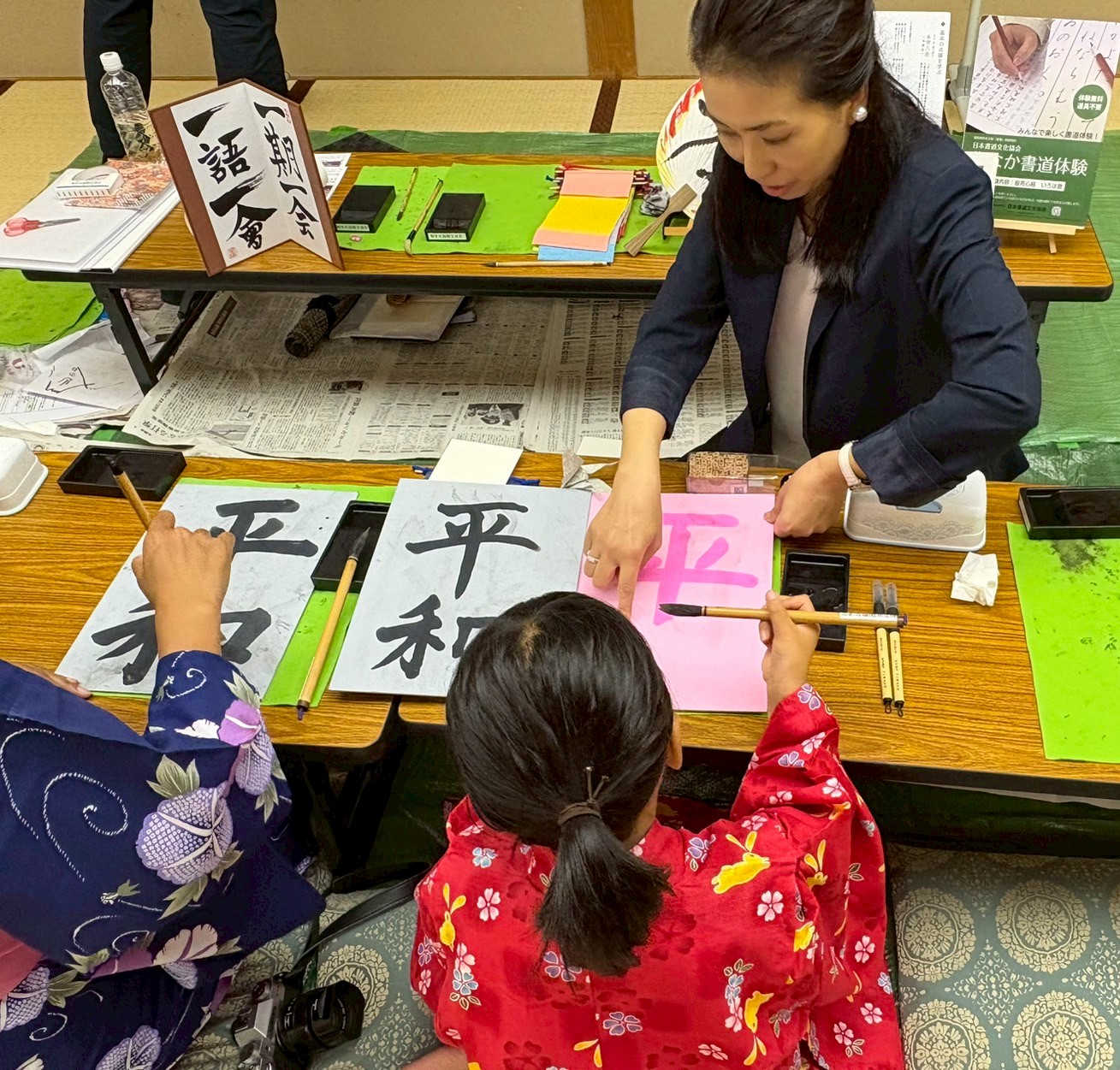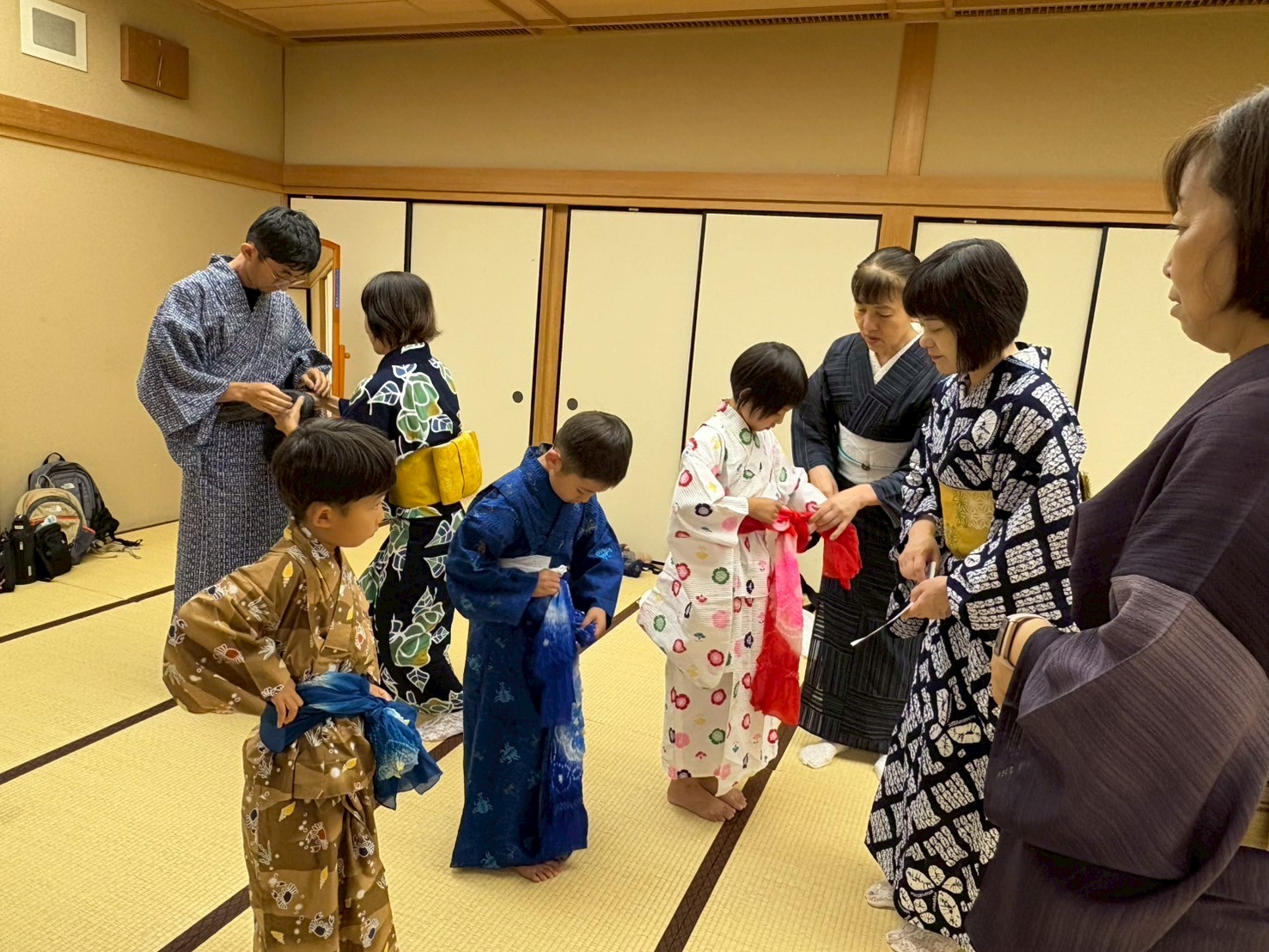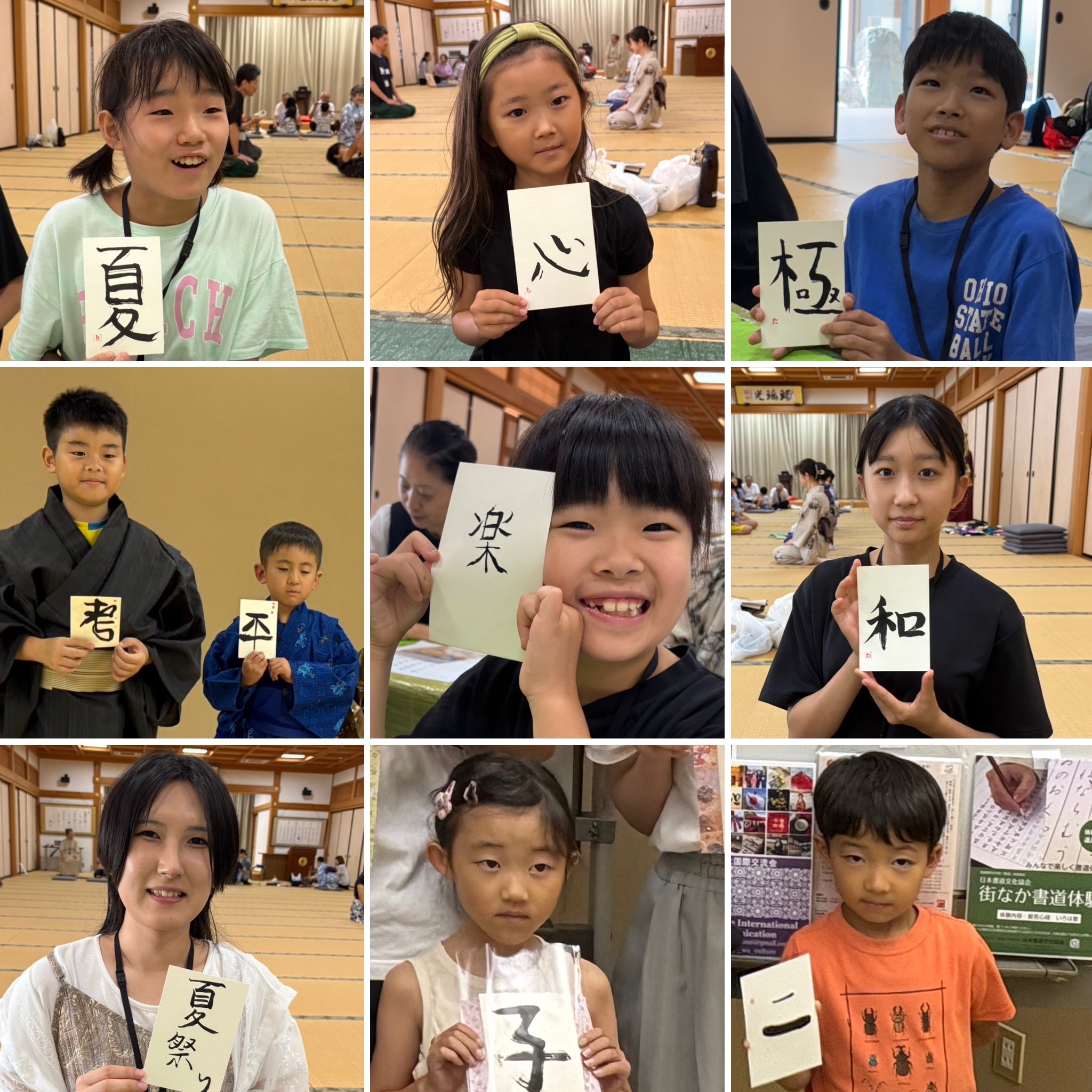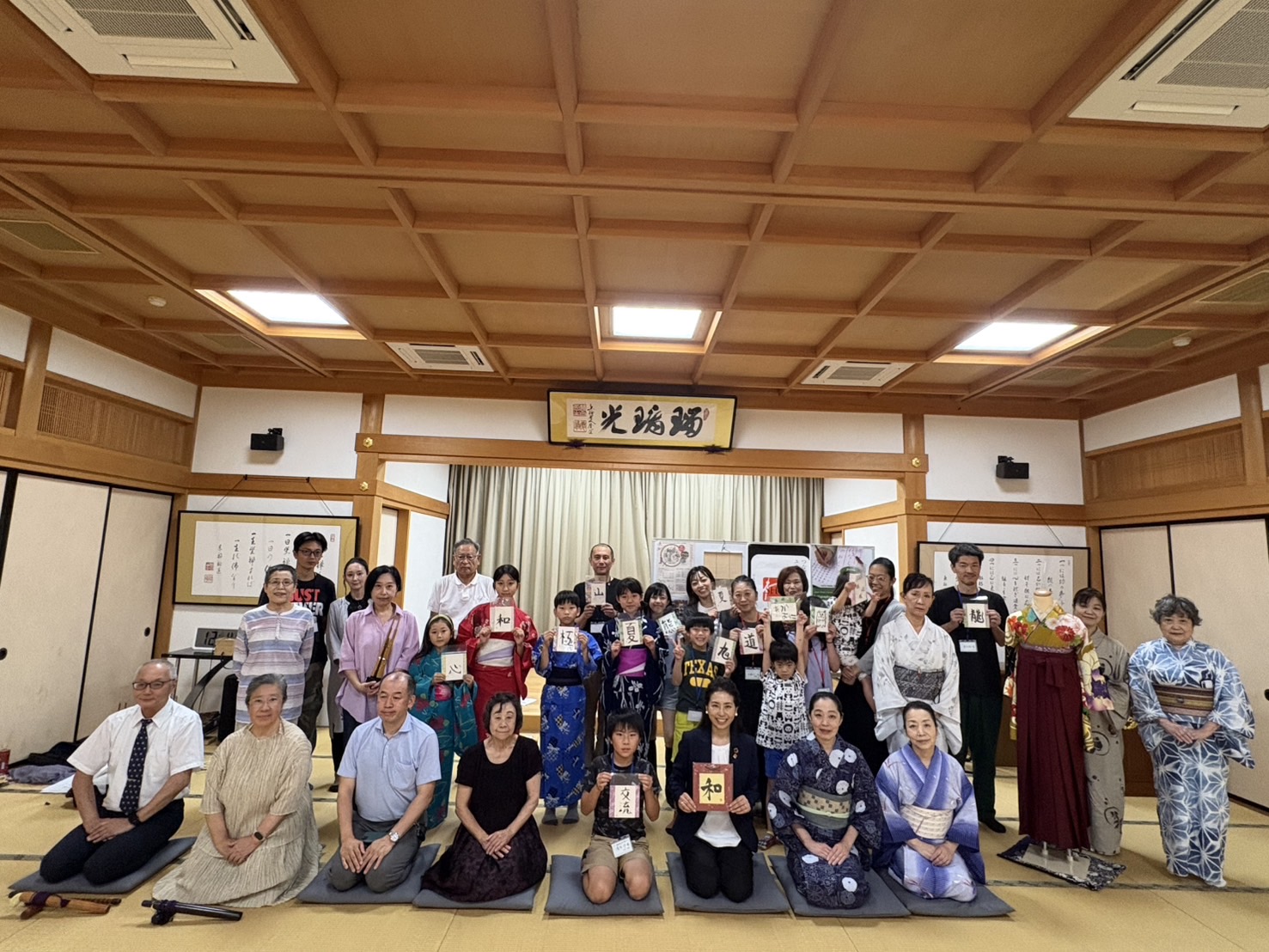Kanjiru ichigo ichie for harmony
~Kyoto・Hiroshima~
Overview
Name of the event
Agency for Cultural Affairs traditional culture parent-child class project (regional development type)
kanjiru ichigo ichie for harmony ~Kyoto・Hiroshima~
Dates
Kyoto: July 19, July 26, August 9, August 23, 2025
Hiroshima: July 20, July 21, August 10, August 11, 2025
Place
Kyoto: Daieden Hall, Tofuku-ji Temple
Hiroshima: JMS Aster Plaza
Organized by
Wa Culture International Communication
Supported by
Kyoto Prefecture / Kyoto City / Kyoto City Board of Education / Kyoto Shimbun / Hiroshima City / Hiroshima City Board of Education
Simultaneous Event
“Calligraphy Experience in the City” (in cooperation with Japan Shodo Culture Association)
Cooperation by
All Japan Waso Consultant Association / Kansai Waso Academy Hiroshima Nishimoto School / Japan Calligraphy Culture Association “Calligraphy Experience in the City” / Fujimori Gagaku Ensemble / Japan Calligraphy Supplies Manufacturers Federation / Naraya Honpo Co., Ltd. / Piacha Music Method
Kyoto Venue
Lecturers
Traditional Japanese Music (Gagaku): Fujimori Gagaku Ensemble ,Hōshō: Machiko Akagi , Hichiriki: Taro Takemura, Ryūteki: Kayoko Takewaka, and others
Japanese Attire (Waso): Kumi Takagi, and others
Calligraphy: Ouka Magari, and others
On July 19, during the parent–child experience event, participants first enjoyed a Gagaku performance by the Fujimori Gagaku Ensemble. Afterwards, they took part in three 30-minute workshops: Traditional Music, Japanese Attire and Etiquette, and Calligraphy. In the music session, they listened to Gagaku, learned about its history, and tried playing traditional instruments. In the attire and etiquette session, they put on yukata and experienced the charm of traditional Japanese dress. In the calligraphy session, they expressed their present feelings by writing a single kanji character with a calligraphy brush, in an activity called Kanji-ru Ichigo-Ichie, inspired by the Zen idea of “one encounter, one opportunity.”
The Parent–Child Workshop Series, consisting of six sessions in total, was held at Daieden Hall of Tofuku-ji Temple on July 26, August 9, and August 23. Participants learned about the history and instruments of Gagaku and chose one of the three wind instruments—shō, hichiriki, or ryūteki—to practice. They studied shōga-hō, the vocal method for practicing Gagaku, and rehearsed Etenraku in Hyōjō mode, one of the most popular pieces, as well as netori, a short introductory melody played before the main performance. They also practiced sound production on the instruments, aiming for ensemble performance with the three winds. In the attire and etiquette sessions, participants learned how to dress in yukata, including tying cords, knotting the obi, and folding the garment. Beyond dressing, they also practiced manners such as bowing, standing, sitting, and walking in a Japanese-style room. In the calligraphy sessions, participants studied basic posture, how to hold the brush, and line practice. They enjoyed kanji-origin quizzes and fun kanji-themed psychological tests. In the Kanji-ru Ichigo-Ichie activity, inspired by the Zen concept of “one encounter, one opportunity,” participants expressed their feelings of the moment in a single kanji character with brush and ink. They created final works on mini shikishi (calligraphy boards), fans, and small hanging scrolls. At the same time, the special program “Calligraphy Experience in the City” (in cooperation with the Japan Calligraphy Culture Association) was also held.
Hiroshima Venue
Lecturers
Japanese Attire (Waso): Kazuko Doi, and others
Calligraphy: Ouka Magari, and others
Cooperation
Traditional Japanese Music (Gagaku): Fujimori Gagaku Ensemble ,Hōshō: Machiko Akagi , Hichiriki: Taro Takemura, Ryūteki: Kayoko Takewaka, and others
On July 20, during the parent–child experience event, participants first listened to a recorded Gagaku performance (with the cooperation of the Fujimori Gagaku Ensemble). Afterwards, they took part in two 30-minute workshops: Japanese Attire and Etiquette, and Calligraphy. In the attire and etiquette session, they wore yukata and became familiar with traditional Japanese dress. In the calligraphy session, they expressed their present feelings by writing a single kanji character with a calligraphy brush, in the Kanji-ru Ichigo-Ichie activity inspired by the Zen idea of “one encounter, one opportunity.”
The Parent–Child Workshop Series, consisting of six sessions in total, was held at JMS Aster Plaza on July 21, August 10, and August 11. In the Japanese Attire and Etiquette sessions, participants learned how to dress in yukata, including tying cords, knotting the obi, and folding the garment. Beyond dressing, they practiced proper manners such as bowing, standing, sitting, and walking in a Japanese-style room. In the calligraphy sessions, participants studied basic posture, brush handling, and line exercises. They also enjoyed kanji-origin quizzes and fun kanji-themed psychological tests. As part of the Kanji-ru Ichigo-Ichie activity, inspired by the Zen concept of “one encounter, one opportunity,” participants expressed their feelings of the moment by writing a single kanji character with a brush and ink, creating final works on mini shikishi (calligraphy boards), fans, and small hanging scrolls. At the same time, the special program “Calligraphy Experience in the City” (in cooperation with the Japan Calligraphy Culture Association) was also held.
Additionally, in Hiroshima and Kyoto, marking the 80th anniversary of the end of World War II, all lecturers and participants folded origami cranes while reflecting on peace and wrote the kanji character for “peace” (平和). Each participant had the opportunity to deeply consider the importance of peace and give shape to their wishes. Recognized worldwide as a symbol of peace, the origami crane is a part of traditional Japanese culture, and this activity provided children with a valuable experience of connecting the spirit of peace to the future.
Video of the event
Enjoy this video of the event ads.(Produced by macaron Labo. Co., Ltd.)
Enjoy this video of the event.
